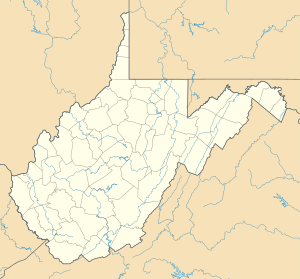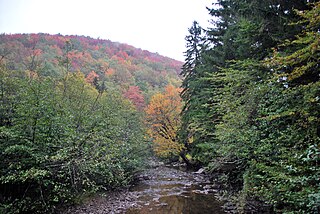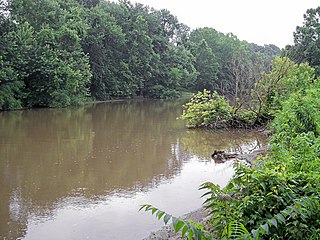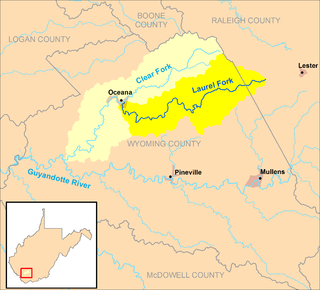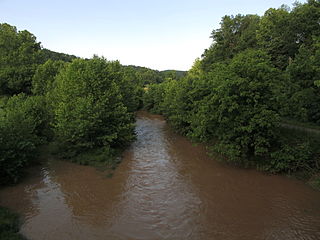| Tenmile Creek | |
Tenmile Creek in Lumberport in 2006 | |
| Country | United States |
|---|---|
| State | West Virginia |
| County | Harrison County |
| Source | |
| - location | southwestern Harrison County |
| - elevation | 1,289 ft (393 m) [1] |
| - coordinates | 39°12′17″N80°31′36″W / 39.20472°N 80.52667°W [2] |
| Mouth | West Fork River |
| - location | Lumberport |
| - elevation | 892 ft (272 m) [2] |
| - coordinates | 39°22′39″N80°20′21″W / 39.37750°N 80.33917°W Coordinates: 39°22′39″N80°20′21″W / 39.37750°N 80.33917°W [2] |
| Length | 26.4 mi (42 km) |
| Basin | 126 sq mi (326 km2) |
Tenmile Creek is a tributary of the West Fork River, 26.4 miles (42.5 km) long, [3] in north-central West Virginia in the United States. Via the West Fork, Monongahela and Ohio Rivers, it is part of the watershed of the Mississippi River, draining an area of 126 square miles (330 km2) [4] on the unglaciated portion of the Allegheny Plateau.
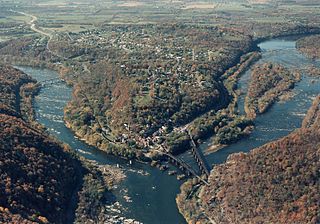
A tributary or affluent is a stream or river that flows into a larger stream or main stem river or a lake. A tributary does not flow directly into a sea or ocean. Tributaries and the main stem river drain the surrounding drainage basin of its surface water and groundwater, leading the water out into an ocean.

The West Fork River is a principal tributary of the Monongahela River, 103 miles (166 km) long, in north-central West Virginia in the United States. Via the Monongahela and Ohio Rivers, it is part of the watershed of the Mississippi River, draining an area of 881 square miles (2,284 km²) on the unglaciated portion of the Allegheny Plateau.

West Virginia is a state located in the Appalachian region in the Southern United States and is also considered to be a part of the Middle Atlantic States. It is bordered by Pennsylvania to the north, Maryland to the east and northeast, Virginia to the southeast, Kentucky to the southwest, and Ohio to the northwest. West Virginia is the 41st largest state by area, and is ranked 38th in population. The capital and largest city is Charleston.
Tenmile Creek and its watershed are located entirely in western and northern Harrison County. It rises in the southwestern part of the county, approximately 8 miles (13 km) west of West Milford, and flows northwardly and northeastwardly to the town of Lumberport, where it joins the West Fork River from the southwest. [5] Its tributaries include Salem Fork, [6] which drains the city of Salem; and Little Tenmile Creek, [7] 13 miles (21 km) long, [3] which flows southeastwardly through northwestern Harrison County and the small communities of Wallace, Brown, Dola, and Rosebud. [5]

Harrison County is a county in the U.S. state of West Virginia. As of the 2010 census, the population was 69,099. The county seat is Clarksburg. The county was founded in 1784.

West Milford is a town in Harrison County, West Virginia, United States. The population was 630 at the 2010 census.
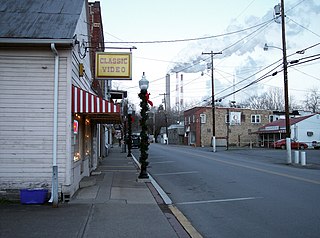
Lumberport is a town in Harrison County, located in northern West Virginia, United States. The population was 876 at the 2010 census.
According to the West Virginia Department of Environmental Protection, approximately 81% of Tenmile Creek's watershed is forested, mostly deciduous. Approximately 13% is used for pasture and agriculture, and less than 1% is urban. [4]

A forest is a large area dominated by trees. Hundreds of more precise definitions of forest are used throughout the world, incorporating factors such as tree density, tree height, land use, legal standing and ecological function. According to the widely used Food and Agriculture Organization definition, forests covered 4 billion hectares (9.9×109 acres) (15 million square miles) or approximately 30 percent of the world's land area in 2006.
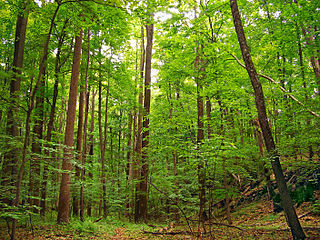
In the fields of horticulture and botany, the term deciduous (/dɪˈsɪdʒuəs/) means "falling off at maturity" and "tending to fall off", in reference to trees and shrubs that seasonally shed leaves, usually in the autumn; to the shedding of petals, after flowering; and to the shedding of ripe fruit.
According to the Geographic Names Information System, Tenmile Creek has also been known historically as Coal Bank Creek. [2]

The Geographic Names Information System (GNIS) is a database that contains name and locative information about more than two million physical and cultural features located throughout the United States of America and its territories. It is a type of gazetteer. GNIS was developed by the United States Geological Survey in cooperation with the United States Board on Geographic Names (BGN) to promote the standardization of feature names.

